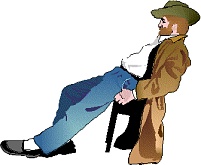| Menachem's Writings | 
|
A Travelogue: Visiting the "New" Jews of Africa
3. The Road from Eldoret, Kenya
to Mbale, Uganda
This is part 3 of my East Africa Travelogue. The travelogue is divided into the following sections:
We leave Nairobi late on Sunday afternoon. We are flying to Eldoret, a town located just north of Lake Victoria, a little east of the Kenya-Uganda border. The town sits about half a degree north of the equator and at an altitude of ranging from 2,100 at the airport up to 2,700 metres. Considering the equatorial location, the weather is mild, night-time temperatures dropping to 13° rising to about 27° during the day. Close to two hundred thousand people live in Eldoret.
We are sitting in a very dull waiting area at Nairobi's domestic terminal when an announcement comes the over P.A. system. Our flight is delayed because of inclement weather on our route. We are flying in a small aircraft, so this is just as well. Our plane surely would not be able to over fly the storm. We are flying with an airline called Fly 540 which proudly describes itself on its website as "Africa's low cost airline".
The delay leaves us ample time to pray mincha before the flight. We adjourn to the back of the departure lounge which appears quieter than where we are now sitting. During our prayers, one of our party notices what he thinks may be a mezuza on the door at the back of the adjacent departure lounge. Couldn't be. Here in Nairobi. We ask the security people if we can have a closer look. After some suspicious glances at us they accede to our request. The second lounge is not being used at this time -- if ever. Of course explaining that we are travelling with Efrat's most holy chief rabbi, who wants to inspect this strange phenomenon, aids our cause. The rabbi and two members of our party are permitted to cross over into the second lounge. The padlocked heavily chained door was not really locked. They just had the chain wrapped around the door handles for effect.
And yes, it indeed is a real mezuza! After some questioning of the security staff, we learn that this room had been once used by El Al as its office. But El Al closed its Kenyan operations nine years ago. I guess they packed up all their goods and chattels and returned home -- but forgot to take their mezuza. Or maybe they still hope to return. I would be happier to fly El Al to Kenya rather than Ethiopian.
Our packed flight eventually takes off, some forty minutes late. We are in the air for about half an hour when I notice, in the failing ambient light, the vast expanse of Lake Victoria below me. We are descending and land not far from the lake's shores. Half the passengers disembark here, but this is not our final destination -- we are in Kisumu. The empty seats are quickly refilled, and after a ten minute stopover we are again airborne. We are just into our ascent and the plane is readying itself for landing. No coffee or snack on this leg.
We are back on the ground, now at Eldoret International Airport, some ten minutes after take-off.
These sponsored links arrive via 3rd party feeds. We have no control over their content.
If they interest you, please feel free to click and see -- your interest in these advertisements covers our site expenses.
The sun has set by the time we arrive. We walk a hundred yards from the plane to the terminal doors. Our luggage is already waiting for us. As we leave the building we see in the background our plane commencing its taxi for its return flight to Nairobi.
We are met outside by Boniface, our driver for the next couple of days. We had intended to make an early start the following morning -- at about 4 a.m. We have a four hour drive ahead of us, plus the border crossing from Kenya to Uganda can waste a lot of time. It would be good to get an early start before traffic builds up.
Boniface informs us that his boss does not allow his cars to be driven on the highways outside of daylight hours. The roads, on both sides of the international line, he reports, are so full of potholes and other obstacles that it is unlikely we could complete a night trip without breaking an axle. We assume this was a little exaggerated, but he is unmovable. On the whole he is a happy sort of, easy going chap, keen to answer our many questions concerning the area's history, geography and politics, and he was genuinely concerned for our welfare.
Eldoret is a large town of nearly two hundred thousand citizens. It boasts a university amongst its attractions. Street lighting is very poor, where it exists. The storm, which blocked passage from Nairobi, finally catches up with us as we leave the airport. We were by now well into the dry season, but the rain is falling in torrents. From the bounces and splashes as we drive, we begin to understand the poor road conditions.
After a bit of searching the dark streets on what seems to be the edge of town, Boniface drops us off at our hotel. It took us about half an hour to get here from the airport. Boniface waits with us until he is sure we are properly checked in.
Sunrise in this part of the world, every day of the year, is at about 6:30 a.m. There is essentially no dawn or twilight here. Boniface agrees that we can leave at about a quarter to six. I suppose he figures by the time we actually leave Eldoret there will be enough light to sufficiently see the road's many obstacles. It will be too early for us to daven at the time we leave -- we will have to stop en route.
Though it's hard to know for sure in the dark, the hotel seems to be comprised of two sections. This part of the hotel is made up of thirty or so round, free standing bungalows, each comprising a big room divided into living and bedroom areas. The little houses are roomy and reasonably clean, but short on facilities. To get hot water, you need to run the tap for ten minutes! Then it was really hot. Fortunately there is no water problem in this part of the world -- everything, even in the darkness, is obviously lush. Wi-fi internet, though listed as room feature, is "not working today", not in the hotel office, nor in the rooms. "You can plug in directly to our local network from the socket in your room". Yes, there are network sockets, but there isn't one with a connector inside, just any empty shell.
My companions were allocated two neighbouring cottages at the top of the fenced off compound, near to the hotel office; I am given one at the very bottom of the hill, on the other side of the internal path. I don't see any other guests as I traverse the area to get to my room, though it is very dark and raining. As a matter of fact, I don't think any of the other bungalows have lights on. The five of us meet for dinner on rabbi's verandah. There don't appear to be any "public" areas in the compound. We decide to make it an early night. We have busy day ahead of us tomorrow and today had also started early.
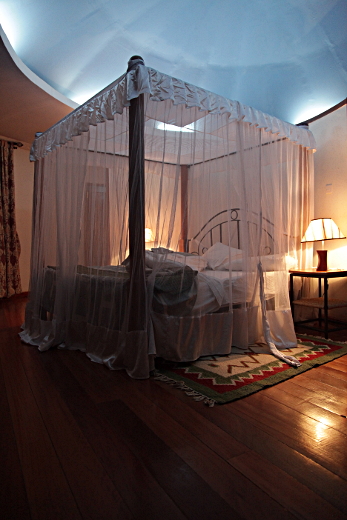 | |
|
Bed with Mosquito Net
|
We are now officially in the "malaria zone". Our beds are equipped with mosquito nets, which we are happy to use. We have already been taking our malaria tablets, something we will continue even on our return to civilisation.
We told the hotel clerk when checking-in that we would be leaving at 5:30 a.m. She is already in the little office when we arrive to check out. Everything outside is wet. The rain, which fell for most of the night, has now stopped. It seems to still be overcast. We come into the office to pay. Surprisingly, the credit card machine isn't connecting. I am by now getting used to the African rhythm, so I can't say I'm amazed. The girl goes through the motions as if something miraculous is about to occur if she keeps swiping our cards, trying to make contact with the credit card company. Alas, no. In the end we have no choice but to pay cash.
As we don't have sufficient Kenyan shillings, payment has to be in dollars. The the clerk informs us she has no change, not in any currency! I would happily take Kenya or Ugandan shillings. The smallest denomination U.S. notes we have are ten and twenty dollar bills. She suggests giving us the change, or a credit, on a future stay. We stand firm on the issue and win the battle. We slightly "underpay" our accounts, indicating we make up the additional sum on our return two days later. We left with a bad feeling about this place. The service here had not been particularly good and the exchange rate she was using was biased heavily in the establishment's favour.
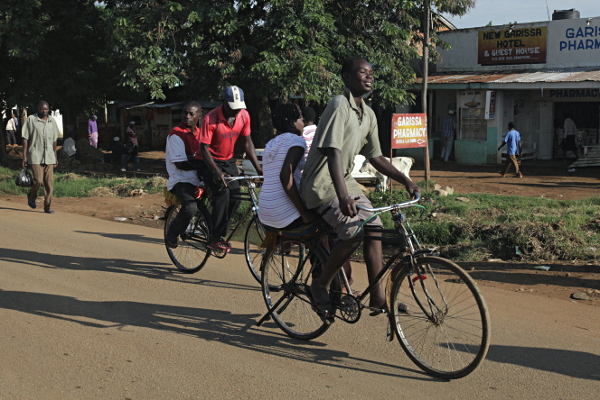 | |
|
View along the Mombasa to Kampala Road
|
Held up by these silly bureaucratic hassles, it is 6:10 a.m. by the time we are on the road. The main Mombasa-Kampala highway runs through Eldoret. It's only after travelling a few miles that I realised we are already travelling an international passageway. The road is only two lanes wide and in very poor condition. Everywhere there are potholes and detours around washed away portions of roadway. In places the road resembles the waves of the sea, sometimes in the direction of travel, sometimes perpendicular to it. A number of times we have to use the shoulder on the opposite side of the road.
We pass potholes up to a metre deep. Boniface says that it is at least four years since any work has been done on the road. Trucks carrying containers ply the highway in both directions on this major artery. Uganda is landlocked, it's main international port being Mombasa, Kenya, on the Indian Ocean. All goods coming into Uganda by sea must pass along the highway on which are now travelling.
Although the sun is only now about to start its rise above the horizon, children on both sides of the footpathless road, are already walking to school. Most are wearing school uniforms. This sight continues for the next hour and a half as we head towards the Ugandan frontier. Some of these children must have a very long walk to school.
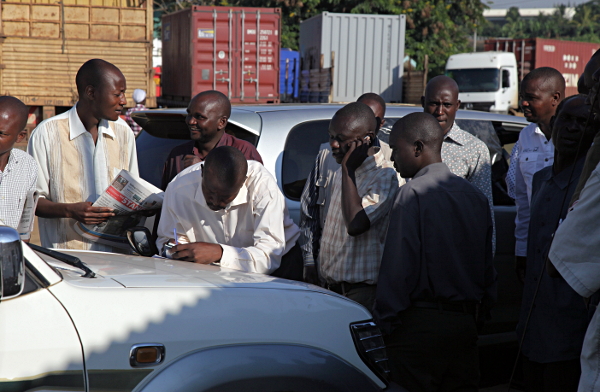 | |
|
Customs Facilitators at Malabe Our man is writing. |
Our trip takes us through the rural countryside, small villages and occasional strips of shops en route. All the time we are passing trucks on the highway, all the time we are navigating adverse road conditions.
After nearly three hours, we suddenly notice that trucks are parked by the side of the road. This queue of vehicles continues for a couple of kilometres or more. The border is nearby. These stationary lorries are all waiting to cross the border. It will take them a day or two until they are on the Ugandan side. Their paperwork will need to be in order to cross and their loads must be inspected. Some of the drivers are washing their trucks, others inspecting their engines. Many are just sleeping, sunning themselves or chatting with their neighbours. Most look bored, but these men are Africa and they march to that slow paced African beat.
We sail past the truckies, at the same time manoeuvring around trucks moving towards us, freshly arrived from Uganda and the ubiquitous road ruts. Suddenly we are driving amidst people running alongside both sides of our vehicle. Some are holding huge wads of money, fanned out like a rummy hand. Others, neatly dressed, are empty-handed. These are the money changers and the immigration/customs agents. Boniface teams up with one of the latter, who is now running ahead of us, indicating to our driver to follow. Others continue to follow us. Our man leads us to a parking bay within the compound. We hand him our passports and he and Boniface disappear into one of the offices. We have arrived at Malaba, the Kenya-Uganda boundary crossing.
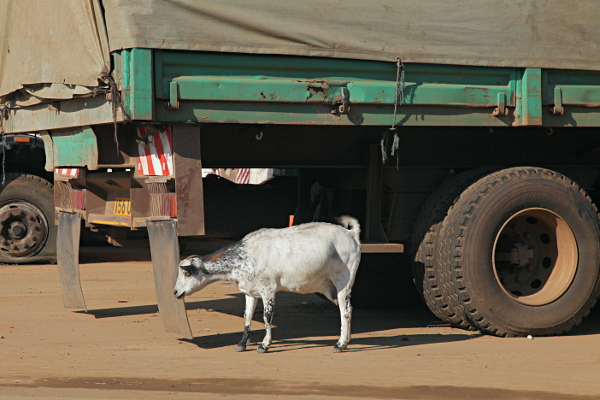 | |
|
A Ugandan Goat grazing in Kenya
|
I take out my camera to take some photographs. Admittedly this place is not very exciting photographically, but holding my camera to my eye has, over the years, become an automated reflex. A white goat is roaming amongst the idle trucks. I am attracted by its sweet smile and shoot its photograph. All of a sudden a six and a half foot tall dark giant is casting his shadow over me, "Who said you could take a photograph here?" Though there are no signs visible indicating such a prohibition, I humbly offer my apologies.
"This is a restricted area", he continues ignoring what I have to say.
"I just photographed that goat", I offer in defence, pointing towards the beast. He isn't a happy camper, but after out-staring me for a few moments, he moves on.
But what is the goat, and a couple of cows and other assorted farm animals doing here, on the Kenyan side of the border crossing? I'm told that lazy Ugandan farmers send their animals out to graze on their own. Their animals wander around the area, sneaking across the border at will, returning back home towards evening.
Back on the border crossing front, things aren't moving too fast. Mention of our venerable companion does not seem to impress anyone here. Everyone seems stone-faced.
As the day is progressing quickly, the rabbi decides now would be a good time and place to daven. We take out our tefillin to perform our morning rituals.
Border business is slow today. The moneychangers and agents are intrigued by our actions and gather around. In response, the rabbi explains to them what they are witnessing. I'm trying to say my prayers off to the side, trying to concentrate amongst all the bustle. Suddenly the rabbi's circle goes quiet. I notice many of the onlookers, heads bowed, are looking down, their eyes closed. Then I see the rabbi, in his tallith and tefillin, arms raised, blessing the gathering.
Th others have finished, but I am still in prayer. "Come on, Menachem, today's a quickie -- we need to get moving". I wasn't aware that God was on fast-forward in the land of the slow beat. Anyway we are still not ready to move on. There's a hitch; there's always a hitch. They've held us up for nearly an hour. They have to find something. That's the way it works. In the end it was that our car does not have a certain logbook. Boniface says that while this may be a legal requirement, he has never been requested to show it at the frontier. What to do? A little palm greasing takes place. Miraculously we are finally on our way. Boniface's boss has agreed to repay the bribe.
We return to the car. The narrow road in front of us descends towards a small bridge crossing a creek. This is the international line. Up the other side and then into another parking bay. We have left Kenya, but we still may not enter Uganda.
Ari Greenspan collects our passports and disappears into an office. Could entering Uganda take longer than exiting Kenya? We'll soon find out. We eat a little, and visit the smelly men's room. The main building in this complex looks more modern than its Kenyan counterpart.
Miraculously we are back on the road in "just" fifteen minutes. We are heading on the highway towards Kampala. The quality of the road here is identical to that on the Kenyan side of the border. The scenery too is very familiar. As is often the case, international lines do not demarcate geography.
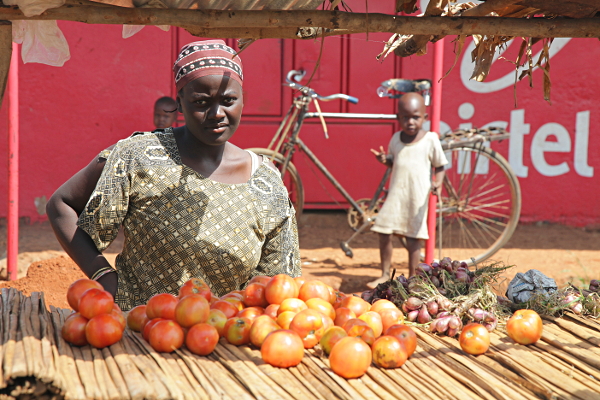 | |
|
Tomato and garlic seller on the road to Mbale
|
After half an hour on the Ugandan side, we make a right turn from the main highway towards Mbale. Road quality, if you can believe it possible, worsens. The road narrows. We see a little roadwork in progress on one stretch of our route. Shops, villages, corn, farm animals . . . .
Another half an hour passes -- we must be lost -- it was supposed to be closer to the highway -- we stop a couple of times to check directions -- finally we reach our destination. Mbale is quite a large town, about half the size of Eldoret, a population of around a hundred thousand people. We had intended arriving earlier -- it's already afternoon. We head straight for the hotel, no time to a acclimatise.
We are on our way to meet the Abayudaya tribe.
Menachem Kuchar, 2nd August, 2011
View more photographs of the drive from Eldoret to Mbale

|
Please enter your comments on this article to Menachem:
Previous posts:
- Stories HomePage
- All of my earlier stories
- A Travelogue: Visiting the "New" Jews of Africa -- 1. Arrival to Africa
- Traps for Young Wedding Players -- a short guide to perplexed prospectives
- The End of Days -- The Ultimate Fulfilment of Prophecy
- On Leaven, Sourdough, S'or and Hamets
- A Life Saved by Dog Biscuits
- More on Capos -- A moral dilemma
- The Truth Always Comes Out in the End -- Or does it?
- Remembering my Father on Yet Another Anniversary of His Death -- Yartzeit and Kaddish -- An examination of Death
- The Rise of Fair Consumerism in Israel -- From the perspective of both the buyers and of the sellers -- The saga of a rug purchase
- The Tale of the Sage and His Beadle
- A Search for Meaning in the Expanse -- How significant is a link in a chain?
- The History of My Family via My Grandmother's Candlesticks
- A Short History of Computational Machines via my Israeli eyes
- Our Sages Tell Us Our Name is Engraved on Our Very Souls -- Our name is our very essense
- Ultimately It Boils Down to Greed and Stupidity -- Doesn't it always?
- Capos, Kapos and Nazi Murder Revisited -- How do Holocaust victims, and how should we, relate to Capos?
- On Fasting and Feasting on Tisha b'Av-Transition to the End of Days, the Messianic Era or Let the Festivities Begin
- Guilt by Association -- Facebook conversations with Australian political novices and Hungarian rotten egg eaters -- how many degrees of separation?
- Simulating Reality, Prophecy and Physics Revisited -- "You donít ever want a crisis to go to waste; itís an opportunity to do important things that you would otherwise avoid."
- Today is the 17th Day of Tamuz -- Why do we bother fasting?
- What the Price of Privacy -- Why do we insist on spying on ourselves?
- Who Will Ascend the Mountain of the Lord, Who Will Stand Erect in His Holy Place -- He who has clean hands and a pure heart, who has not sworn in vain against My soul and who has not acted with deceit
- More on Simulating Reality -- Responses and discussion on the original post
- Facebook and Styrofoam -- Man is a Social Creature
- Simulating Reality -- "I, at any rate, am convinced that He does not throw dice"
- Why Do Jews Love a Free Lunch? Anything, Anywhere and with Anyone
- The Present and Future of Communications and Social Media
- The Putrid Parable of the Capped CupCakes A picky porcine person's particularly prickly problematic predicament
- The New World Order via the Prophets of Israel
- The Place of the Holy Temple Today
- The Road from Presov to Kosice. A Mere Sixty Kilometres or an Eternity?
- It's a Matter of How You Say It
- On Matza, Soccer Balls and Red Wine -- How long is a piece of string?
- Woosh, Plump, Ploop, Shhhhh
- On the Psychology of Sex and Wombats
- Stay Away from Bureaucracy. It will swallow you alive
- A Eulogy to my late mother
- The Power of the Web. Finding a manuscript and a family
- Why I Like to Photograph Reflections or Why Do I Always Do Things in Reverse?
- A DisKosher Disdelight. Almost eating out on Broadway
- What Was the Crime of the Sodomites? -- Jingoism, xenophobia or sodomy?
- The more things change, the more they stay the same -- On Babel, the New World Order, One World Government, Carbon Trading and Socialism
- Three Holocaust Experiences: My friends tell me their stories
- "The End is Nigh" -- The clock ticks on -- another step towards Final Redemption
- The History of My Family via My Grandmother's Candlesticks
- I Once Had an Uncle
- Another Uncle and Another, Very Different, Holocaust Experience
- Demographics -- It's Absolutely Not Only About Numbers
- Three Men Spend a Night in a Cold Birmingham Hotel Room
- Swimming with Orders of Nuns and Phyla of Crustaceans
- A Hassidic Story in Real Time
- The Lesbian Rabbi Lied to Me
- All of my Stories
And don't forget to look at my latest (and classic) photographs at www.Menachem.co.il
Enjoy!
